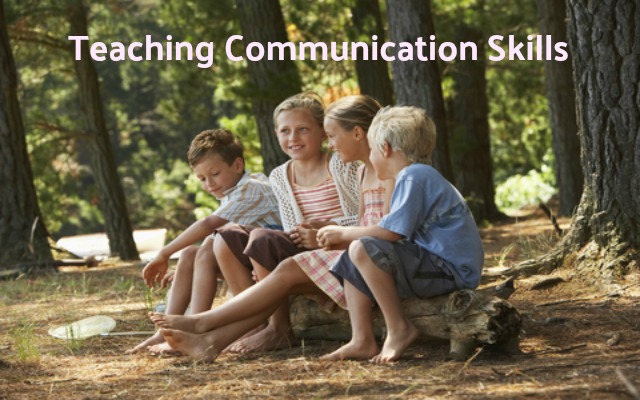Teaching Communication Skills


Homeschooling provides our children opportunities to interact with a variety of individuals. It’s important to be diligent in teaching communication skills.
Whether at home, church, with extended family, or somewhere within our community, my children enjoy socializing. As they model the behaviors they see around them, it’s important that I monitor their conduct. I cannot always control the language and actions they hear and witness.
Recently, in the midst of an intense Nerf war, I heard my son laughing and calling out to his sister, “…So look out idiot,” just as a dart sailed over her head. As this was not a first incident of name-calling, I immediately drew attention to his poor choice. When asked why he called her an idiot, he seemed genuinely clueless how I perceived it as an insult. He pointed out that he had not said it in a mean tone and was just having fun.
Wanting to avoid the name “Idiot” being adopted as a term of endearment for his little sister, I had my son look up and define the word. He was then encouraged to write out a statement as to how the expression did not apply to his sister.
Personal communication skills need to be developed within our children. Having had a child with an ASD (Autism Spectrum Disorder), I’ve had extra opportunities to practice communication. The specific elements I’ve found important for all children are words spoken, tone of voice, and body language.
Words Spoken – We’ve all heard, “Sticks and stone can break my bones, but words will never hurt me.” Well, it’s just not true! We must encourage our children to choose their words carefully. We cannot always control what they hear others say, but we can encourage them in the words they choose to speak.
Do not let any unwholesome talk come out of your mouths, but only what is helpful for building others up according to their needs, that it may benefit those who listen. Ephesians 4:29
Tone of Voice – The tone of our voice often reflects our mood and emotions. We can choose to speak kind words, but they will be meaningless if we yell them in anger.
A gentle answer turns away wrath, but a harsh word stirs up anger. Proverbs 15:1
Body Language – I never used to consider body language an important element of communication, until my ASD child never looked at me when being spoken to. I was convinced he never heard a word I said. If you cannot relate to that example, maybe you have a daughter that has at some time rolled her eyes at you.
Those whose eyes are ever so haughty, whose glances are so disdainful; Proverbs 30:13
Although training can be given to a child with poor communication, do not overlook an issue of the heart. If they are harboring hurt feelings or selfish intent, it’s important to address it immediately. Gently point out their choice of words, how they sound, or how their body language appears. If they are struggling with a heart issue, help them talk it out. Suggest alternate ways to communicate respectfully and have them role play.
My ASD son often told me he didn’t hear how he sounded. In his adolescence, that became a quick excuse for an abusive tone. It is important to hold our children responsible. I may have understood his high functioning ASD, but the rest of society could not. After countless opportunities to role play a better tone of voice, he learned to speak more gently.
It’s important to work within the abilities of a child. Just as I know a toddler is going to have a harder time calmly expressing frustration when compared to a teen, I know my ASD son will never be at ease looking me in the eye. Find ways to help your child comfortably navigate their interactions with others. I had explained to my son how looking at someone was a way to indicate he was listening. He did not need to stare, but learned to offer “check in glances.” He demonstrates attentiveness by occasionally glancing up and looking at my forehead or at my eyebrows.
God blessed me with children that change behavior after multiple corrections. We repeat lessons of communication over and over. I know if I am diligent, they will learn to take responsibility for their words, intentions and actions. With practice, their confidence will grow as they effectively interact with the individuals around them.
Teresa is a wife and busy homeschooling mom. With a passion for writing, she shares the adventures and lessons of her faith, family and homeschool.














































